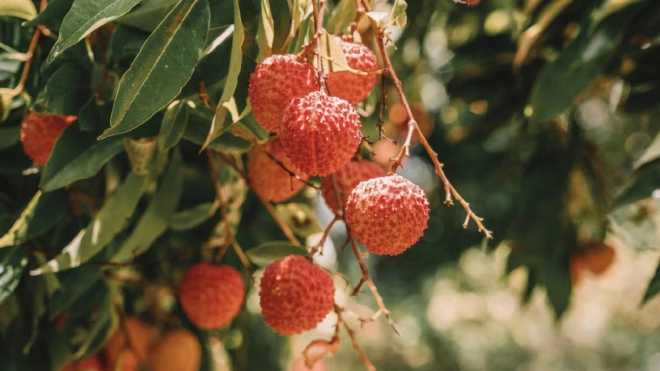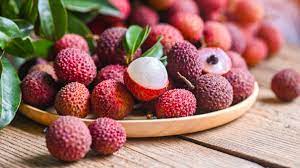
Know the Nutritional Value, Benefits and Best Time to Eat Lychee
Lychee has many health benefits such as improving skin and strengthening the immune system. Lychee is the most popular fruit with its sweet and juicy taste.
Lychee is a tropical fruit that delights in hot weather. It is from China’s Guangdong and Fujian provinces and is popular worldwide for its sweet taste and many health benefits. In addition to eating directly, lychee can also be eaten as part of a salad or juice. You can add them to smoothies. Although canned lychees are available, they often contain sugar and sweeteners and should be avoided. Read on to learn more about lychee, its benefits, and how much you should eat every day.
What is lychee?
Lychee, also known as litchi, is a juicy, large-seeded fruit with a red outer shell and a white interior. It is a very popular fruit in Asia and is available during the summer months. They grow in India and Vietnam, Indonesia and Australia. However, although it looks like a large fruit, it is part of the category of fruits called drupes, which are fruits with seeds and flesh.
Nutritional content of lychee
Lychee is rich in vitamins, minerals and water. According to the U.S. Food and Drug Administration, 100 grams of lychee contains the following nutrients.
- Water: 81.7 g
- Energy: 66 Kcal
- Protein: 0.8 g
- Fat 0.4 g
- Carbohydrates: 16.5 g
- Fiber: 1.3 grams
- Calcium: 5 mg
- Magnesium: 10 mg
Health Benefits of Lychee
Here are some benefits of eating lychee:
1. Strengthens immunity
Lychee is a good source of vitamin C and increases immunity. 100 grams of lychee (about 10 fruits) contains 71.5 mg of vitamin C, which is more than your daily requirement (75-90 mg). This also helps strengthen immunity. A study published in Food Research International shows that probiotic lychee juice has a positive effect on the immune system and gut microbiota. Studies have shown that lychee juice can alleviate immune system dysfunction and alter intestinal flora.
2. Healthy skin
Lychee can also help your skin look better because it helps stimulate collagen production. Collagen makes the skin firmer and increases its elasticity. It also helps the skin heal faster and protects it from sun damage. This study, published in the journal Acta Horticulturae, states that it also helps moisturize the skin.
3. Keep your liver healthy
Lychee fruit contains polyphenols that help reduce liver damage. A study published in the journal Nutrients found that lychees may help treat hepatic steatosis (fat in the liver) and gut dysbiosis (intestinal disease) in people without alcoholic fatty liver disease. It does this by controlling intestinal bacteria.
4. Reduce the risk of cancer
Lychees may reduce the risk of certain types of cancer, such as breast, colon, and liver cancer. Lychee seed extract may also help slow the progression of prostate cancer, according to a study published in the journal Scientific Reports. Studies have also shown that lychee seed extract can prevent lung, cervical, stomach, liver and nasopharyngeal cancer.
5. Rich in antioxidants
Lychee extract is rich in polyphenols and has high antioxidant capacity. This study, published in the journal Food Chemistry, notes that lychees contain epicatechin, which helps heart health and reduces the risk of cancer and diabetes. It is also rich in Rutin, which helps fight infection.
The best time to eat lychee
Although lychees have many health benefits, they are also rich in carbohydrates and should be eaten in moderation. The best time to eat lychee is in the morning on an empty stomach. This facilitates the absorption of nutrients. You can consume it as a mid-morning snack. However, since lychee contains sugar, it is better to use it as a substitute for other snacks rather than adding it to them.
How many lychees can you eat in a day?
Since lychees are high in sugar and calories, it is better to eat them in moderation. An adult can eat about 10-12 lychees a day. However, if you are diabetic, do not eat more than 6-8 lychees a day. It is best to consume lychees in fruit form because juice and canned lychees contain a lot of added sugar and preservatives.
Side effects of eating lychee
Eating too much lychee also has some disadvantages. Sometimes they can cause an allergic reaction. A study published in Pediatric Allergy & Immunology describes an allergic reaction in a 12-year-old girl 30 minutes after eating raw lychee. Although this situation is rare, it should be taken into consideration.
Also, do not eat lychees immediately after a meal, as the juice will immediately start to ferment. It will not be absorbed because your stomach is full.

Bottom Line
Lychee is much more than a delicious and pleasant fruit. Its sweetness, flavor and juiciness make it the choice of snacks, desserts and drinks. From boosting the immune system to supporting digestion and hydration, lychee is a versatile and delicious addition to any diet.


